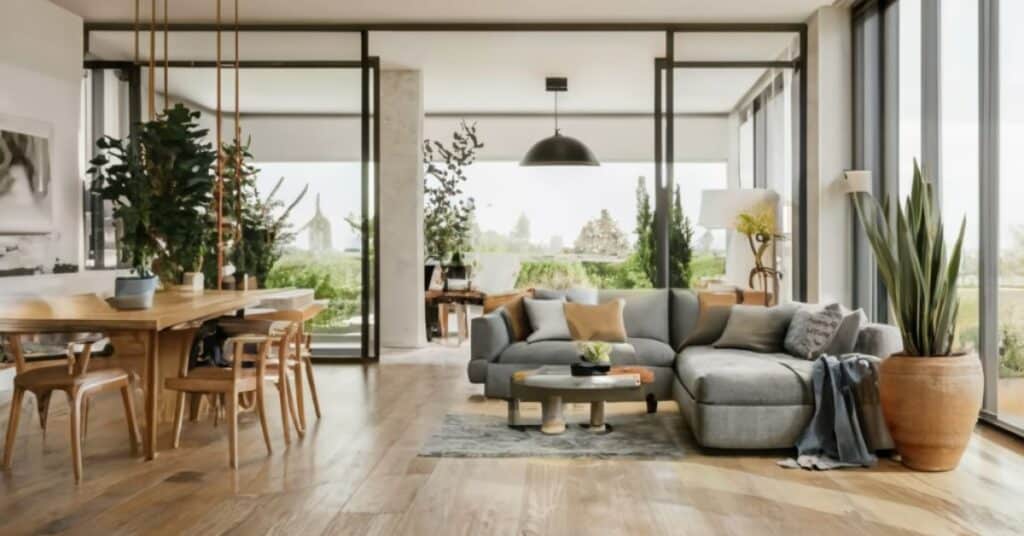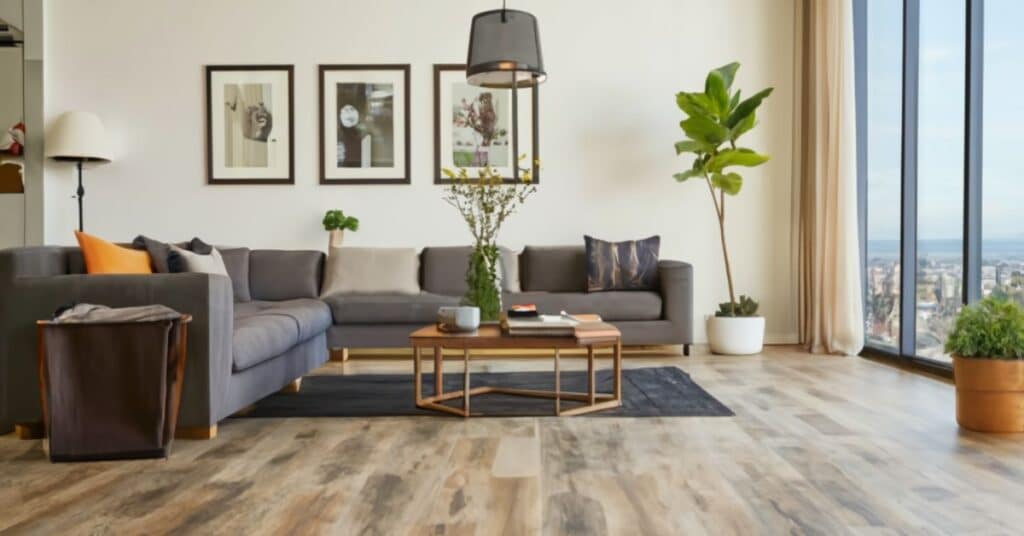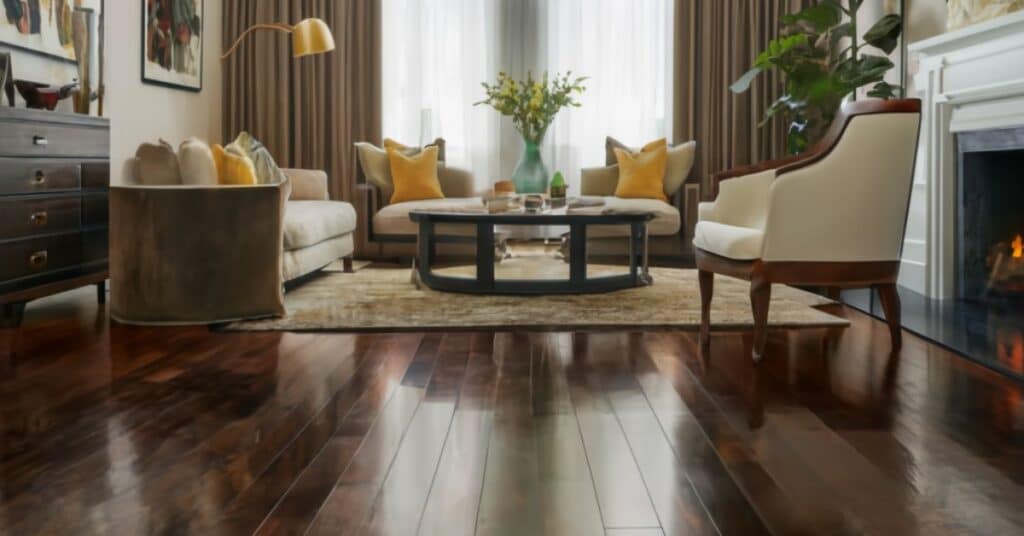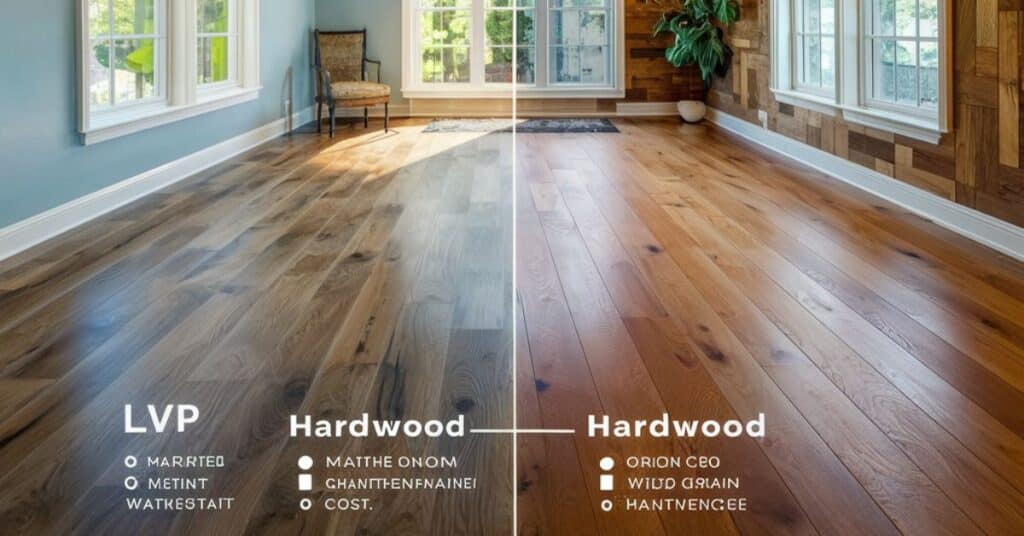Choosing the right flooring can significantly impact both buyers and sellers. Luxury vinyl plank (LVP) and hardwood are two popular options with distinct pros and cons. Understanding their differences is crucial for making informed decisions in the real estate market.
Changing your home’s floors isn’t just about aesthetics it’s a decision with lasting implications. From improving resale value to influencing buyer perceptions the choice between luxury vinyl plank (LVP) and hardwood is pivotal. Let’s delve into how these flooring options shape the real estate landscape. Determine the impact of floors on buyers and sellers: LVP vs. hardwood.
Selecting between luxury vinyl planks (LVP) and hardwood flooring significantly affects home value and market appeal. LVP offers affordability and durability, ideal for busy households. Hardwood exudes timeless charm and can elevate a property’s perceived value. Understanding these options’ impact is essential for both buyers and sellers.
Buyer Preferences & Flooring Choices

Buyer preferences play a significant role in the flooring choices they make, influencing the impact of floors on buyers and sellers: LVP vs. hardwood. Many buyers prioritize durability and ease of maintenance when selecting flooring materials, considering options like luxury vinyl plank (LVP) and hardwood for long-lasting solutions.
Understanding these preferences helps sellers make informed decisions about property upgrades, as buyers often weigh the aesthetic appeal of different flooring types.
Some prefer the classic elegance of hardwood floors, while others appreciate the versatility of LVP, considering factors like color, texture, and overall style when making their decisions. By aligning with buyer preferences, sellers can enhance the attractiveness of their properties in the real estate market.
The Appeal of Hardwood Floors
Hardwood floors hold timeless appeal for many homeowners due to their natural beauty and warmth. The rich textures and unique grain patterns of hardwood add character and charm to any space.
Additionally, hardwood floors often increase the value of a property and are considered a desirable feature by potential buyers.
Beyond aesthetics, hardwood floors offer exceptional durability and longevity. With proper care and maintenance hardwood floors can last for generations, making them a worthwhile investment for homeowners. The versatility of hardwood also allows it to complement various interior design styles from traditional to modern, further enhancing its appeal in residential settings.
Universality and Refinishing of Hardwood Floors
Hardwood floors possess a universal appeal that transcends different architectural styles and interior design preferences. Furthermore, their ability to be refinished multiple times allows homeowners to rejuvenate their appearance and extend their lifespan, ensuring long-term satisfaction and value.
Softness Underfoot and the Use of Rugs
Hardwood floors, while visually appealing, may lack the softness underfoot that some homeowners desire. To address this, many opt to use rugs strategically placed in areas of high traffic or where extra comfort is needed, adding both warmth and coziness to the space.
Exploring Luxury Vinyl Plank (LVP)

Luxury vinyl plank (LVP) offers a cost-effective alternative to hardwood flooring, mimicking its appearance and texture at a fraction of the price. With its multilayer construction, including a wear layer, wood-look design, vinyl core, and backing, LVP provides durability and waterproof properties, ideal for high-traffic areas like kitchens and bathrooms.
Installation of LVP is relatively straightforward, with options for floating, click, or glue-down methods, making it accessible to both DIY enthusiasts and professional installers. Its versatility extends to various subfloor types, including wood, concrete, or even existing tile, saving time and money on demolition and preparation.
Maintenance of LVP is simple, requiring regular sweeping and mopping with mild soap and water or a manufacturer-recommended cleaner to keep it clean and vibrant. Additionally, the ability to replace damaged planks quickly and inexpensively ensures long-term durability and aesthetic appeal for homeowners seeking a practical and stylish flooring solution.
What Are The Benefits Of LVP?
Luxury vinyl plank (LVP) offers numerous benefits including affordability, durability and versatility. With its realistic wood-look design waterproof properties and easy maintenance, LVP provides a practical and stylish flooring solution for homeowners seeking the aesthetic of hardwood without the high cost and maintenance.
How Does LVP Compare To Other Floors?
When comparing luxury vinyl plank (LVP) to other flooring options its advantages become clear. LVP stands out for its affordability durability and water resistance making it a compelling alternative to hardwood, laminate and tile floors.
Financial Considerations & Value Added
When considering the financial aspects of flooring, luxury vinyl plank (LVP) often emerges as a cost-effective choice. Its lower initial cost coupled with minimal maintenance expenses makes it a budget-friendly option for homeowners.
Additionally, its durability and long-term performance contribute to its overall value potentially increasing the resale value of a property.
It’s essential to weigh the upfront cost against long-term benefits and resale value. While hardwood floors may require a higher initial investment they often add significant value to a property and appeal to buyers seeking premium finishes. Homeowners should consider their budget, lifestyle, and long-term goals when making flooring decisions to ensure they get the best value for their investment.
Related Content: How To Clean LVP Flooring: A Step-By-Step Guide
The Resale Advantages of Hardwood Flooring

Hardwood flooring offers compelling resale advantages due to its timeless appeal and lasting durability. Homebuyers often perceive hardwood floors as a premium feature that adds value and elegance to a property, making it a desirable investment.
Additionally, hardwood floors can withstand the test of time and maintain their beauty with proper care potentially increasing the resale value of a home.
Also, the versatility of hardwood flooring allows it to complement various interior design styles and adapt to changing trends over time. Its natural warmth and character create a sense of luxury and sophistication that appeal to a wide range of potential buyers. As a result, investing in hardwood flooring can be a strategic decision to enhance the marketability and overall value of a home.
Also Read This Blog: Flooring Face-Off: Luxury Vinyl Vs. Hardwood
Why Is Vinyl Plank Flooring So Popular?
Vinyl plank flooring is popular for its affordability, durability, and versatility in mimicking the look of natural materials like wood and stone. Homeowners appreciate its waterproof nature, making it suitable for high-moisture areas like kitchens and bathrooms without sacrificing aesthetics.
Its easy installation process and low maintenance requirements further contribute to its widespread appeal among DIY enthusiasts and families alike.
How Much Does Vinyl Plank Flooring Cost?
Vinyl plank flooring comes in a range of prices, typically costing between $1 to $12 per square foot, depending on factors like quality, brand, and installation method. The cost may increase by at least $2 per square foot if you opt for professional installation, but overall, vinyl flooring tends to be more affordable than hardwood.
Factors such as water-resistant features, installation method, and brand influence the cost of vinyl plank flooring, with higher-quality options usually priced at a premium. While the initial investment may vary, vinyl flooring offers a cost-effective alternative to hardwood, providing a similar aesthetic appeal at a fraction of the cost.
Conclusion
The impact of floors on buyers and sellers, particularly in the comparison of LVP versus hardwood, is crucial in shaping real estate dynamics. This exploration underscores the profound influence these flooring choices wield, guiding individuals toward judicious decisions in the property market.
Understanding the nuanced effects on both buyers and sellers is paramount for making well-informed choices that align with overall real estate objectives. The Impact Of Floors On Buyers And Sellers: LVP Vs. Hardwood serves as a valuable resource in navigating this intricate landscape.
Frequently Asked Questions
Is luxury vinyl plank flooring suitable for all areas of the home?
Yes, luxury vinyl plank flooring is waterproof and can be used in any area, including bathrooms, kitchens, and basements.
Can hardwood flooring be refinished if damaged?
Yes, hardwood flooring can be refinished to restore its appearance and extend its lifespan, making it a durable long-term investment.
How much does LVP flooring cost compared to hardwood flooring?
LVP flooring typically costs less than hardwood flooring, ranging from $2 to $7 per square foot, including installation. How does this compare to the cost of hardwood flooring?
Is LVP flooring better than hardwood?
LVP flooring offers advantages such as affordability, water resistance, and easy maintenance. How do these benefits compare to those of hardwood flooring?

Warner Clips is an expert writer with 4 years of experience crafting engaging content on Home topics. My expertise ranges from creating cozy environments to tackling Home Improvement projects. Find my work in publications like Huffington Post and Reader’s Digest.







